#Building Html Template
Explore tagged Tumblr posts
Text
I really should look into whether or not someones already made a better implementation of the ideas that I have...
#trying to make a tool to generate static websites from markdown#the idea is that you would have a template html file and you'd put “[content]” somewhere in it#and my tool would go through all ur markdown files and convert them to html and replace the “[content]” thing w/ the rendered html#trying to make it in c which was like maybe a mistake cause out of all the languages I know its the one I'm the least experienced in#and its only one I know that'll let me shoot myself in the foot#and I don't really know much about the proper way to build things#tried fucking w/ make but I like need a .so file or smthing to compile it? and idk what I'm supposed to do w/ that thing#honestly now that I think about it this could prolly just be a bash script lol
1 note
·
View note
Text
E-commerce website: How to create an e-commerce website
How to create an E-commerce website If you are thinking about creating your ecommerce website then this information will be very beneficial for you. It is very easy to setup an e-commerce business, you just have to follow some information, after this you can create an e-commerce business and sell your goods. We will tell you step by step simple methods here. 1, first of all you must have thought…

View On WordPress
#build an e-commerce website from scratch with react#design and launch of e-commerce website notes#e commerce website example#e commerce website name#e commerce website project#e commerce website templates#e-commerce website design#e-commerce website in india#how to build an e-commerce website step by step pdf#how to build an ecommerce website from scratch#how to create an e-commerce website using html#how to create an ecommerce website for free#how to create e commerce website#how to make an e-commerce website with html css and js#how to make e-commerce website using html and css#steps to design and develop an e-commerce website#top 10 e-commerce websites
0 notes
Text
ok i actually did just make an account on neocities ✌️
need to get back to properly learning html. i'm moving to neocities bitches. going back to old web. we can follow each other via rss feeds
#now to build the site. i know there are templates and such so i might just start with those#but my goal is to be a coder<3#and html is really not that hard. there are free tuts. i did a bunch months ago when i got hyperfixated on this but then the fixation waned#but i need to get back into it
11 notes
·
View notes
Text
========================================================
[tutorial: build your own neocities/nekoweb page]
========================================================
a beginner's guide for making your very own home on the indie web—retro, personal, weird, and 100% yours.
this ain’t an average wix, squarespace, or tiktok aesthetic.
we’re talking full html/css with soul and attitude.
[ prerequisites ]
------------------
> an idea
> basic text editor (vscode, notepad++, or even notepad)
> account on https://neocities.org or https://nekoweb.org
> some gifs or tiles you love (dig deep or make your own)
> optional: image host or gif repo (or self-host everything)
[ feeling overwhelmed? read this. ]
-----------------------------------
you do *not* need to know everything.
html is not a mountain. it's a garden.
you plant one tag. then another. then a style. then a button.
you can build your site piece by piece.
and every piece is a portal to somewhere personal.
you are allowed to make broken pages.
you are allowed to use templates.
you are allowed to start over as many times as you want.
this is *your* world. you control the weird.
[ step 1: create an account ]
-----------------------------
> neocities: https://neocities.org
> nekoweb: https://nekoweb.org
register a name, log in, and enter your file manager.
this is where you upload your files and see your site live.
[ step 2: your first file - index.html ]
----------------------------------------
make a new file: `index.html`
basic starter:
<html>
<head>
<title>my weird little corner</title>
<link rel="stylesheet" href="style.css">
</head>
<body>
<h1>welcome to the void</h1>
<p>this is my page. it’s strange. like me.</p>
<img src="mygif.gif">
</body>
</html>
> upload to the dashboard
> boom. you’re live at
https://yoursite.neocities.org
or https://nekoweb.org/u/yoursite
[ step 3: add a style sheet - style.css ]
-----------------------------------------
create a file called `style.css` and upload it.
here’s some nostalgic magic:
body {
background: url('tile.gif');
color: lime;
font-family: "Courier New", monospace;
text-shadow: 1px 1px 0 black;
}
img {
image-rendering: pixelated;
}
marquee {
font-size: 20px;
color: magenta;
}
link it in your html and the vibes activate.
[ step 4: decorate it like a haunted usb ]
------------------------------------------
> use <marquee> for chaos scrolls
> embed gifs from https://gifcities.org/
> steal buttons from https://cyber.dabamos.de/88x31/
> set up a guestbook at https://www.smartgb.com/
> loop audio with <audio autoplay loop>
> add fake errors, 90s web lore, random link lists
[ step 5: resources, themes, and comfort ]
------------------------------------------
> templates & layouts: https://numbpilled-themes.tumblr.com
> glitchy gifs & buttons: https://glitchcat.neocities.org/resources
> layout builder: https://sadgrl.online/projects/layout-builder/
> free tiled backgrounds: https://backgrounds.neocities.org/
> beginner html intro: https://www.w3schools.com/html/
> pixel fonts & cyber assets: https://fontstruct.com/
remember:
you don't need to know js. you don't need to be a coder.
you just need a mood, a direction, a dream.
the html will follow.
[ bonus concept: shrine pages ]
-------------------------------
> a page just for one character you love
> a room to house digital fragments of your identity
> embed quotes, music, images like altars
> call it shrine.html and link it from your homepage
[ closing mantra ]
------------------
you are not here to be optimized.
you are not a brand.
you are a ghost inside the machine,
carving your initials into the silicon void.
welcome to Your website.
========================================================
#webcore#old web graphics#neocities#web graphics#carrd graphics#carrd resources#rentry decor#rentry graphics#carrd moodboard#carrd inspo#neopets#indie#indie web#early web#webdevelopment#web development#web resources#web design#old internet#old web#oldweb#nekoweb#transparent gif#tiny pixels#pixel gif#moodboard#tutorial#html page#html theme#htmlcoding
448 notes
·
View notes
Text
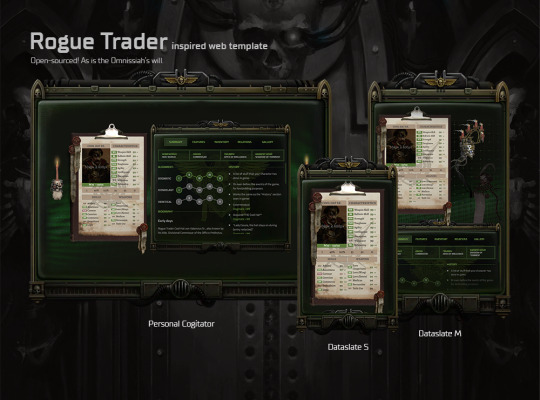
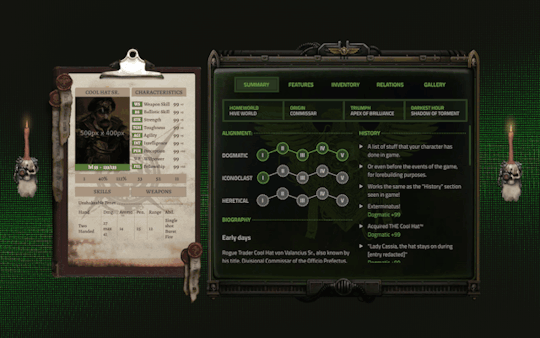
I finished coding my Rogue Trader character sheet template! It's now open sourced on GitHub 🤖
☆ Features
Display your character's stats in (almost) the same way as you've seen in Warhammer 40,000: Rogue Trader CRPG
Multiple sections for character building:
Summary: Character origin info, alignment level, history, and biography.
Features: Show off your build by listing abilities & talents that your character has gained throughout the course of the game.
Inventory: Your Rogue Trader's equipment, armour, etc. goes here.
Relations: Detail the relationship of your Rogue Trader and their retinue members.
Gallery: Place to show off your fanart, commissioned art, fanfics, playlist. Anything goes!
Cool floating servo skulls (only visible in certain screen sizes).
Responsive. Not horrible to look at even in small screens.
☆ Requirements
You would need a static site hosting service for this to work. I recommend Neocities or GitHub pages. Both are free.
Some experience with using npm.
Some experience with basic HTML and JS object/JSON is recommended.
I really wish that it's easier to use and set up, but it's just not possible due to the tech stack I chose initially... I did write a beginner's tutorial on the repository's wiki, but I don't know if it makes sense to normal people who do not code... If you have any questions, let me know and I'll see what I can do.
Tech stack: SvelteKit, SCSS, TypeScript
Bonus:
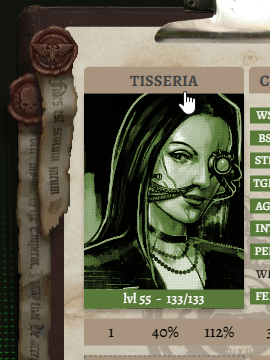
Name too long? No problem :)
#link to the github repo is in the source!#I made a draft of this post then posted this on Reddit then forgor about it again rip.#rogue trader#warhammer 40k rogue trader#warhammer 40k#warhammer 40000 rogue trader
284 notes
·
View notes
Text
you should make a website!
"my favorite social media site is shutting down!"
"the CEO of the site i use just committed another atrocity!"
"i want a webspace that's all my own!"
if any of these sound like you (and if you're on tumblr, i know at least one applies) you should make your own website!
why make a website?
incredibly customizable
you can put whatever you want on it
it's, well, your own! like a house you build with your own hands
things you'll need
a computer. you can maybe get away with doing this on a mobile device, but i have zero experience there
a code editor. i like VScodium, which is a de-microsoft-ed version of VScode.
a will to learn ;)
site hosting
neocities. everyone knows neocities. at this point i do feel like it's become a bit too centralized, but it's a good option nonetheless. do note that there are filetype restrictions for free users, but that shouldn't be a huge issue for most. what may be an issue, though, is that there's a content security policy that prevents sites made after jan 1st, 2024 to use outside scripts. also, you have to pay to use your own domain
nekoweb. similar to neocities, but there's no filetype restrictions or a content security policy. some differences are outlined in the FAQ (thinking about moving here... i am a traitor...) i'm not sure if domain support is free or paid.
github pages or codeberg pages. you'll need an understanding of git for this
pages.gay: run by besties.house, uses git
teacake: free hosting is currently closed, but paid hosting starts at 2 bucks a month.
leprd.space: i know next to nothing about this.
a web server. don't recommend this if you don't know computer stuff but it is an option (you'll likely have to provide your own domain though)
gripes & solutions (?)
i'm not comfortable maintaining pages in pure HTML / templating with JS sucks!
with a static site generator, you can write pages in markdown and they'll be converted into HTML and (if you'd like) be put into a template of your choosing. my personal choice is 11ty but there are tons of options!
static site generators can be a bit of a learning curve (and you will have to write some html for templating) but if you're making a lot of pages or blogging regularly it's something to consider
there are starters for 11ty online but i might make a more beginner-proofed starter and/or guide in the future? don't count on it
i don't want to write/maintain CSS
simpleCSS is a tiny CSS file you can use to make semantic HTML ("naked" HTML) look nice. it's got decent customization options too. it's not particularly fancy or opinionated, but it's a good starting point if you need something
i don't know what to put on my website!
small list of ideas:
weblog
art/writing/music gallery
movie/show/book tracker
place to store bookmarks/links
scary! i'm scared!
my askbox/messages/e-mail inbox/etc. are open to anyone who'd like to ask for help!
422 notes
·
View notes
Text

I wrote a guide on my main blog on writing SimLit a while back, but I figured I'd amend it to make it more suitable to Tumblr and post it here as well.
Please note, that there is no one way to write SimLit; creative work is always subjective. You do not have to do everything in this guide, obviously- just focus on the bits that apply to you and what you want to write. This is a gathering of my own ideas, the way I do things, and other options as well. Depending on your writing style, some of this will be more relevant to you than other bits will. This is both for the challenge players and the people who write stories with little basis off anything going on in the game.

I have made a story / challenge-planning document that you can read about here that will give you a place to put all your ideas!
The fun part...sort of...is coming up with all your rough ideas. Things to think about are:
. Where you'll put your story: The most popular place for SimLit these days seems to be Wordpress, but there is always Blogger and LiveJournal as another option for a place to put your story. Tumblr is a great place for stories that are more picture-based and less textual, or if you plan to only have dialogue for your story text. Have a look at what different platforms have to offer to see what suits you.
Whilst I would say Blogger is a bit harder to properly customise than Wordpress and you have to rely on custom templates made by other people and some HTML editing if you want a nice blog template, it is very generous in terms of picture limit. To my knowledge, any image under 2048 on the longer width won't count toward your Photo space (as of 2025).

. Narrative or Gameplay-Driven: Some writers will write commentaries to go alongside images of challenges they're doing. Some write commentary for their general gameplay. Others use Sims solely as a way to 'direct' a story they've come up with themselves instead. Others make comics. Some do a mix of various things... Have a think about what kind of story you want to do. It might even change halfway through writing, you never know!
. Genre: You won't always have an easily-defined genre for your story, but you might have some ideas. Romance, Fantasy, Sci-Fi, Horror, Family...the options are more or less endless.
. Custom Content: If you use CC, it can help to look for CC you might need for your story- whether that's poses, CAS items or Build/Buy items.
. How you will plan your story: Some SimLit authors write entirely around the game and don't pre-plan anything (brave people you are going by the seat of your pants, I used to do this but now I could never), but others like to plan story points and character notes beforehand. There are plenty of ways to plan your story, whether that's jotting ideas in a notebook or on a word processing document. There is one I already made linked at the beginning of this section.
There are also programs like Scrivener designed for writers to plan stories (it's not free, though). It depends how in-depth you need to plan things out before you write. With me, it really depends. Some story ideas, I have most of the plot planned in my head from the get-go. Other times, I only have a rough idea and have to go from there.
. What challenge you will do: If you want to write a commentary/story around a challenge, look for one you'll find fun first. Long or short? What rules will you change or omit? How much will you let the challenge and game drive the story? Will you be writing commentary, or will you be writing in a narrrative-type style inspired by what happens in the challenge?
. Rough plot / character ideas: Write down any plot or character notes that immediately come to mind, even if you don't know if you will use them. Anything that comes to you straight away is a good place to build on later and should be jotted down whilst it's still fresh in your mind.
. How you will write your story: - Commentary VS. Narrative: Will you write a commentary around your screenshots/gameplay, or will you write it in the style of a prose-like story? You can also mix both of these approaches in various ways.
Or do you want to go about it in a different way? Maybe you could use your screenshots to make a comic-style story. Another option is to possibly have something like an epistolary novel (written almost entirely in letters) or even a 'scrapbook story' (a story told in multiple ways with multiple artifacts- letters, newspaper clippings, phone calls, almost anything).
- Tense and Viewpoint: Will you write in past tense or present tense? Will you write in third person, or first person? How many different characters' viewpoints will you have if you write in first person? (...Or are you like me, and will accidentally switch between tenses throughout the whole story?)
. Themes: It's good to think more in-depth of what themes will appear in your story. Family bonds, friendships, relationships in general, dealing with various aspects of life, prejudices, overcoming fear...the list goes on forever. Whilst I personally don't like reducing stories to tropes, tropes are always a place to start if it works for you.
. General length: Do you want to ideally write a short story, or something longer? This won't always be something you'll have in mind straight away, but that's fine.
. How much to plan and when to start: It's up to you how much you need to pre-plan and when to start writing, but I don't start writing until I'm at a point where I know that the story can be resolved. I don't start writing straight away, in case I end up with a story I somehow can't finish.
. Upload frequency: You won't always stick to this, since most of us are busy, sad and tired adults- but it's good to try and think about how often you want to upload chapters. Are you aiming for weekly, monthly, or just whenever you manage to get a chapter out? What I will say is please TRY NOT TO STRESS about schedules. If your readers are impatient that's their problem and they can wait until you're ready!
. Gather inspiration: Whether it's authors, shows, films, art, music...anything that gets you in the right mood and frame of mind for what you want to do. Moodboards are sometimes a good idea as well for collecting inspiring pictures. Make inspiring playlists of songs that get you in the mood for the story or characters.
. The sliding scale of 'Utopia' and 'Dystopia': On a scale of 'Paradise' to 'Hell-hole world', what's the rough state of the world in your story like? Maybe it isn't that simple, but it helps to have an idea if it's thematically relevant somehow.
. Any messages or lessons: Are there any messages you hope to get across in your story, or anything that a reader may be able to learn from it at all? Not always the case with every story, and this is not the sort of thing that you'll do intentionally. For my own story, it's very much just a snapshot of history so there isn't really much of a defined moral to the story.

This is geared more towards people who are writing mostly story-driven SimLit, since commentary and gameplay-driven stories often don't require any sort of major world-building. That, and the challenge you are doing might already have the worldbuilding situation laid out for you, like the Apocalypse Challenge or the Alien Adoption challenge, but I'll build on this a bit too.
As someone who has been Game Master for DnD and Pathfinder, I'm used to fleshing out worlds, building on lore and the like- and being a Game Master often requires you to do it on the spot sometimes. For me, it's good to have some level of lore and world-building written out. I like having a certain set of 'rules' to stick with, mainly to help keep consistency of the universe's 'rules'. This is especially important with my Magic Universe since the magic system needs a level of consistency I have to try and stick to. (That said, I have occasionally changed tiny less-significant bits of lore as I go...shh...don't tell anyone!)
But where do you start with such a thing? First off, this isn't something you have to do in massive levels of detail (unless you want to!).
Here's the general way of how I do things. Feel free to pick and choose which bits will apply to your story; you don't have to pre-plan every little last detail about your world if you don't need/want to.

--Starting with the already-established relevant worlds and lore--
I almost always start out with the 'official' stuff first. You can find this in-game, in item and world descriptions, in trailers, and on Sims Wikis. Sims isn't the most lore-heavy game for obvious reasons, but now and again you've got something to work with. It all depends on exactly what you're writing about, and how much your story will revolve around the actual Sims universe.
--Seeing what I want to keep from the already-established worlds and lore, and what to get rid of--
I don't keep everything all of the time, and it's unlikely you will either. Sometimes your idea is better, or fits better with what you've already got in mind. Or perhaps the Sims 'lore' behind the thing is too comical and wouldn't fit a slightly more serious story.
--Start stealing ideas! (Go careful though)--
Writers worry way too much about originality, but everyone takes little bits of ideas off each other all of the time- everything is inspired by something. That, and in my opinion there’s absolutely nothing wrong with doing a story that’s a ‘love letter’ to a genre with all the tropes and cliches you can think of.
So gather up some inspiration and see what ideas others have; have a quick read of SimLits that are similar to your idea. Look at the lore behind shows or video games that are the same genre as you are writing. Think about your favourite shows, films and video games as well. Or even look at the official Sims forum or Tumblr to see what people have done with worlds, premade characters and the like. On the official forum, there are a lot of ‘What have you done with…’ threads where people discuss what they have done with premades and in-game places.

One thing I tend to focus on the most when worldbuilding, is the sort of socio-political aspect of the world. 'But why does everything have to be political?', you say, but everyone's life is governed by social and political ideas - some more than others, so for me it's what makes up a big chunk of the worldbuilding because of how much it influences the characters living in that world. That, and a few big historical events I tend to think of as well to flesh the world out. If this sounds like something you feel like delving into, then here's some ideas:
NOTE: Some of this won't apply to your world or focus, so just ignore the stuff that isn't relevant to your story.
--Events in history leading up to your story--
This will depend entirely on what you story is about, but events to think about are:
. Inspiring figures from the past: For example, if you're writing about vampires, are there any in history who are still iconic to this day? What made them iconic?
. Any miscellaneous important events? My more specific ones are geared more towards conflict, but there's always going to be important events that happened that stay with people that happen in the world and they aren't always going to be bad. (Yes, the author of Divided really did just say that.)
.Changes in laws and/or major attitudes towards groups: Were there any rules or legislations that came into play that completely shook the world of your story?
.Conflicts: Wars and other major conflicts in history will linger around for years and years in various ways
Modern society
This is looking at your present day in the story in more depth. This can help you with characterisation as well- how has modern society affected your character and their development and current attitudes?
. Attitudes towards certain groups: Who or what is celebrated in society? Who has to deal with negative attitudes and why? How are people choosing to fight back, positively or negatively, against positive or negative change? Is there any prejudice at all, or is your world almost entirely accepting of different types of people?
. General morale: How happy are the different groups of people in your world? Is there still need for change, or are people more or less okay with the way things are? Is there an imbalance in the welfare of different groups and why?
. What's/who's popular: From people to events relevant to the story you're trying to tell, what's popular and well-known? Are there any events or people that are causing change or debate that might be addressed later?
. Fashions: It helps to think about what's fashionable in your universe sometimes, but maybe that will all depend on what kind of CC you can get a hold of.
. What the future holds: What ideas do people have for the way things may change as time passes?
-
Magic, superpowers, or other power systems
If your story has some kind of system of 'special' power- magic, or superhero powers, certain chemicals, powers granted from deities or the like- it's good to have some rough idea for how they work:
. Is this power innate? Can it be learned? Is it within the person, or is it an outside source of some kind?
. Is this power a finite or infinite source? Is it a physical object, is it ethereal/energy, a chemical, etc?
. What limits are there to the use of this power? When can it/can't it be used? What downsides are there to using this power (illnesses, magical overcharge, death, etc)? What consequences are there for overuse of the power?
-
Beliefs and belief systems
Your story might have some sort of 'collective' belief systems- common superstitions, or religions like Sims Medieval’s Jacoban or Peteran faiths, or maybe even cults. If so, it's good to outline those, though the amount of detail you'll need for it will depend on the kinds of beliefs and the story you're telling.
. What are the core / defining rules / lessons /ways of living of this belief?
. What actions/attitudes etc are rewarded, and what attitudes are frowned upon? What rewards and punishments are there for such things, if any?
. How has this belief system affected other people outside of that belief system? What do 'outsiders' think of the belief and the people that practice it?
. Are there any key figures in this belief system? Are they real objects/people, metaphysical beings, or are they not real at all?
. Are there any specific meetings or practices etc. associated with this belief?
. Do people of this belief own specific special clothes or objects? What significance do they have?
IMPORTANT SIDE NOTE: When it comes to world-building, ALWAYS go careful when using any real-life cultures, beliefs or events outside of your own culture etc- especially those of marginalised groups. Try to do your research as thoroughly as possible.
To avoid potential upset or misrepresentation, I either rely on fictional creations or keep things vague. For example, I'm using the lore behind the Sims Medieval's Jacoban and Peteran religions in an upcoming story to avoid making a fictional religion that people might mistake as a parody of an existing one.
Do any research you need to do
Once again, how in-depth you go depends on how far you want to go- how realistic you want it to be, how historically-accurate you want it to be...Sometimes it's good to just have enough to get a rough idea of something to add on to. For example, if you're doing a historical story, it might be worth just seeing what big events happened, social taboos, etiquette etc. just to get a feel for the rough world of your story. For anything that isn't an important topic, I'm not bothered if it's inaccurate. For example: if it turns out the soft background science of something in my work is a bit wonky, I don't entirely care. However, for serious subjects like mental health etc, I always make sure to get a good idea of what I'm doing before I write it. If I get it wrong, I could end up spreading massive misconceptions and that's the last thing I want to do. -
World-building towns and cities
Not everyone's story is going to have a huge deal of focus on this sort of thing, and additionally to the top you might want to go even further with building onto what's already given to us. So here's some other things that might be worth thinking about if you want to do a bit of extra fleshing-out for the game worlds. When I say 'individual world' I mean the actual playable worlds on their own as opposed to the ts4 worlds altogether at once. If you're doing a challenge and the challenge has worldbuilding aspects, like Alien Adoption Challenge or the Apocalypse Challenge then that is a brilliant thing to give you some level of a framework for some aspects of your story's world.
. Rough population of the individual world etc.
.Landmarks and their significance
.Tourism, what do other people like to do whilst they're there
.What sorts of people tend to live there
. What the individual world is known for the most, what puts them 'on the map', so to speak

Characters are my main focus as both a writer and a reader. I can have a good story with great characters and a thin plot, but a story with a great plot and boring characters is never going to interest me. They can also be difficult to come up with ideas for. Here is a rough idea of how I come up with characters, and how I build on pre-made characters.
Some people have written 'character interviews' - these can sometimes be helpful. You fill them out from the characters' point of view, or from a third-person perspective but about the character. The 'Marcel Proust' character interview is a great one to use, since it asks questions that will no doubt be relevant to both the character and the plot later on. Some of them have questions about favourite food, colours etc. but for me, this is more often extraneous than not. Then again, knowing too much about your character for some people is better than not knowing enough.
My own character 'interview' is here. It's technically not an interview and is just a list of things to consider about your character. You may get some use out of it.
First off, before anything: think of what to base your character on, roughly. Think of the traits of people you know or have known, think of aspects about yourself. Of course, we can't forget basing characters off of your favourite fictional characters!
If you are writing a premade character, and you're unsure on what to expand on, first off look at their in-game traits, any information provided in trailers/promotional material, and then look at fan theories and ideas about the character. Those are good places to start if you're using a premade Sim.
As well as specific characters, think of your favourite traits, archetypes, and development types as well. One of my favourites is the downfall of a character, a tragic character whose constant screw-ups land them in a deeper and deeper mess. Even better when they start going off the rails a bit as well. I also love characters who struggle with others' kindness, who learn to let themselves be loved over time.
Then you can get to outlining them.

The basics about your character
. Name: Is there any meaning behind this name in-story? Did the character choose it themselves or is it their birth name? What nicknames do they have, if any? Which do they like, and which do they hate? (Names don't have to have meaning. I only use meaningful names in certain contexts- most names are just names I like, names that just fit for some reason, or that a character's parents thought sounded nice).
NOTE ON NAMES: If you want an authentic name for a character from a specific time period, look at census records for the country if they're available or see if you can find articles on people from that country and time period. You can also Google naming conventions, as they can change within a country over time as well. I also recommend avoiding baby name websites or baby-related websites when you want authentic names for characters that aren't English or American. It's best to find blogs written by people from that country. Sometimes travel blogs for the country will sometimes talk about names, authenticity and such. Sometimes Wikipedia has lists of names as well, but it's worth double-checking any info found there.
. Rough description: Height, rough weight, colours of skin/hair/eyes, the general 'vibe' of their attire or a more in-depth description. Anything notable about them, like specific jewellery, clothes, tattoos or scars/other injuries?
. Identity: This could be anything from where they grew up, gender, race, sexual orientation, or if they are an occult sim or some other made-up species or race. How has their identity affected their life? Do they face any prejudice or mistreatment for any of it at all, or does it give them more of an advantage over others?
. Family: People in a character's family, whether blood family or found family.
.Beliefs: What they do (and maybe don't) believe in.
. Protagonist or antagonist: Not always this black and white for every character, but good to think about your character's rough place in the story. Of course, one can become the other as the story progresses.
-
Character-defining aspects
. General personality traits: You can use in-game traits and Randomise to give you ideas, or you can think of your own personality traits for the character.
. Upbringing: What it was like growing up for them. Who was good to them? Who wasn't? How have these people and experiences shaped who they are today? How was the world different growing up to what it's like now? Does the character mourn the old ways of the world or do they like the change?
. Social class: How has this affected their life?
. Education: Might also connect with upbringing here- how was school/university etc. for them?4
. Goals/dreams: Almost everyone has a goal, even if they never achieve it. Even if it's just getting out of bed to make breakfast and then getting back in again.
. Social life: Extrovert, introvert or somewhere in the middlle? What do they do when they hang out with friends etc?
. Fears: What are they afraid of? What do they do to avoid that fear, if anything?
. Any conditions, illnesses, or neurodivergence: (ONCE AGAIN, go careful when writing things like this and do research where it's needed.) How have they affected the character's life and their outlook in general? How does it affect how others percieve them, if it does at all? If applicable, what caused them?
. If not that, then general physical/mental health: How well (or not) does the character look after themselves in these ways? What do they do for self-care and distraction?
. Likes and dislikes: People, things, events, hobbies...What makes them happy and what makes them want to punch a wall?
. Character 'flaws': Flaws don't necessarily have to be absolutely-horrible things, it can be just things that can hold the character back in some way. Some things that characters may overcome in a story might not necessarily be flaws as well- for example, introversion isn't a flaw (I wish writers would stop treating it as one), but possibly some characters may seek to try and 'come out of their shell' socially a little. Most characters have some kind of flaw or personality 'aspect' to overcome or learn to deal with, but the best kind of character flaws are the ones that actually get in the character's way in the story. The joy is in seeing how the character overcomes these flaws...or even how the character gives into them more and more as the story goes on. Wretched excess is fun sometimes!
. What they're good/bad at: Where do they excel, where do they need a little practice, and what are they absolutely terrible at?
. Any special ablities or powers: What can this character do? What are the limits of this power? How do they feel about this power?
. Things they are known for: Whether by friends, family, colleagues or the world. What are they known for? What do people like and dislike about them?
. Ideas for development: How do you (at the moment) see the character changing? If you have any ideas for it, who or what will help to influence that change?
. Relationships with other characters: How they do (and don't) get along with other established characters, and maybe why. -
Things to think about character-wise when writing your story
Once you get to writing your character, here's a couple of things that it helps to think about- though some of it is more relevant if writing in the first person.
. What your character does and doesn't notice: How do they approach the world around them? What sort of things do they notice first in their surroundings?
. Manner of speech: Formal, or informal? Do they have any mottos, catchphrases or words they use often? Do they speak about feelings a lot? Do they lie, and how often? Sometimes what isn't spoken can say as much as what is spoken.
. How they socialise and deal with others: Do they overthink things in discussion? Do they pick up on social cues? Do they often over-analyse the actions of others, or do they let everything go over their head? Are they confident in socialising, or not? Maybe their out-of-dialogue musings are complex, but they keep to not revealing much in their speech.
. How they cope with negative emotions: Do they break down, or blame others? Or do they power through it?
. In connection to some of the above points, think about your character both from the outside and inside: How do others see them? How do they think they come across to others? How do they come across to themselves? And finally, who are they really on the inside?

An important aspect to think about especially is character motivation. I've written this one separately from the bullet points since I think it's especially important given character motivation will play a major part in driving the plot along, as well as relationships with the other characters. This might not be something you'll have a solid answer to until you start writing, but it's good to have some starting ideas.
. In the broadest and simplest sense, what does your character want? Money, fame, honour, redemption, happiness, revenge...Have a think about what it is that they strive for deep down. (If you're struggling for ideas, maybe it might help to look at the in-game Aspirations, or maybe even the Traits will give you some ideas).
. How far are they willing to go to get it? Are there limits they won't go to in order to get what they want? Or are they willing to step on whoever's toes? This might be a change that occurs over the story, that's always an interesting concept. Seeing the well-behaved character slowly and gradually challenge what is acceptable...
. Who, or what 'kickstarted' this motivation? Some people just naturally come to want something, maybe as they grow up and/or their general interests, hobbies etc. change. Some motivations are brought on by events, though. Maybe harm done to a loved one motivates them to seek revenge, or something they did in their past motivates them to seek forgiveness or redemption for their actions.
For challenge players, you can always define your characters through funny commentary, I always like seeing that. One story had one generation founder constantly break the fourth wall and be the only one who realised they were in a game and it made them stand out in a comical way.

Let me start off by saying: Plot is my weak point. I struggle to organise ideas when both reading and writing, I always have done. As usual, for plots it's best to think of your favourite plots from stories or a 'stock plot' like The Hero's Journey, Wretched Excess etc. It's also good to think about any potential plot points that come to mind straight away, so then you have starting points and can fill in the gaps- this is generally what I do. And honestly, I don't think it's that bad to re-use themes and plot pieces sometimes. Sometimes it works better to stick with what you're familiar with, than it is to try a thousand things at once that are new or different to you.
Do you see yourself as a 'plotter' or a 'pantser'? I'm a bit of both, though I'm leaning towards more of a plotter now. I wish I could write everything by the seat of my pants, but sadly I can't.

The way I initially began planning for a longer, more in-depth story is by making a table in a word processing document that is one column wide, with loads of rows. Just one giant row of loads of columns. Each box in this table will be for specific notes, and the order of these notes in the planning table goes like this:
. Title ideas/preliminary ideas: What it says on the tin, and the very, very first ideas for the story.
. Rough story ideas: Any ideas that come to me in the pre-planning stage go here. Ideas for anything at all- screenshots, scenes, lines of dialogue, anything!
.Background information to be aware of: Any relevant lore or research goes here. Sometimes I keep story research in a separate document.
. Previous story points to be aware of: Any previous characters or events to be aware of to aid in consistency.
. Current plot threads: Keeping track of plot threads that need to be resolved in some way, to help prevent plot holes.
. Character info: Character information in varying levels of depth. At this point, this usually only covers main characters.
. Character Development: This almost always changes halfway through, but this is my plan for how characters will change as the story goes on, and the events and characters that will be catalysts for that change.
. Backstory: Character backstory goes here instead, to keep things organised.
. Ideas for future chapters: Any ideas at all for upcoming chapters, no matter how vague. This also includes things that absolutely have to happen later on.
. Story ideas: Various boxes, all of which have more detailed story ideas. At the moment these are defined by specific events, and these are just for the direction of the story.
. Chapter (X): The main story planning, with one box for every chapter. This is where the story starts to be sorted by chapters as opposed to just events. Things always get swapped around during the writing process: Some things get moved until later, moved to happen earlier, or omitted/changed entirely.
The general idea as I'm going, is that each chapter has to move at least something forward. We learn something new about someone, a character's actions have changed something or caused a consequence, a character has learned something, etc. Somehow things have to be different from the beginning of the chapter to the end of the chapter and that is generally how I go about it. Whilst a lot of people frown on whole chapters that 'info-dump', for some stories it might be necessary- especially for futuristic or alternate history stories where the author will need some filling-in on the general state of this unfamiliar world.
Again, how much you want to/need to plan depends on what you're doing. Nowadays I write narratively, and the game has little bearing on the actual story.
If you're going with a gameplay or challenge-driven story you probably won't need much planning, if any at all.If it helps, it's worth doing what you can to create associations of some type within your planning- whether it's symbols, bold/italic, colour-coding, anything. That might aid you in keeping important bits of the notes tied together somehow, whether it's done by scene, character, important plot points etc.
It may help to highlight important bits as well in your word processor, so you can easily find things you know you have to go back to soon. I sometimes do this since I easily get lost in my own notes...
-
Other Planning Ideas
. Starting from the end: It might be easier to go backwards if you come up with your ending before your intro. You can always start with your end point, and then figure out how you got there.
. Mind-maps: If a massive list of boxes doesn't sound ideal, it might help do a sort of mind-map or flowchart. This is better if you are the sort of person who'd rather take in small bite-sized pieces at a time. You could have one mind-map for the beginning, middle and end, and then do little branches off for different events. And then from those branches, possibly add more for other details surrounding that specific story event, or things to remember for later on down the line.
. 'Snowflake method': Put simply, it's writing down a simple plot point or idea and then continually expanding on it until it's at the level of detail you need for your plan- the way a typical snowflake's points branch out. As a random example: - Dave goes to get some cheese. - Dave has discovered a monster in his kitchen, and it demands a block of cheese or Dave's life. Terrified, Dave goes out to get some cheese to appease the monster. - A monster that can only live off of cheese is used to eating the bits of dropped cheese off Dave's kitchen floor, but Dave has decided to do more cleaning now his girlfriend is moving in. Desperate for survival, the monster has escaped its hiding place, demanding a block of cheese from Dave for its survival. If Dave does not supply cheese, he will be killed by the monster.
. 'Five-part narrative'/Pyramid: Breaking down your story into the five main parts of most stories: - Exposition: This is mainly setting up the world of your story - the setting, the main goings-on in the area, the characters we will be following throughout the story, and also the driving point which sets the main characters ahead doing plot stuff. - Rising action: The rising action is generally the part where the characters' antics, or possibly something caused by the world around them, sets stakes higher and puts more pressure on them. Perhaps the character has made a grave mistake. People could be after them. Or perhaps some kind of natural disaster has caused massive issues for the character. How will they come to navigate all of this? - Climax: The rise up to the 'turning point' or the height of the drama in your story. Maybe your character finally has some kind of breakdown, their actions have led them into the worst situation possible, but good can arise from this...or your character can just keep going down the slippery slope. - Falling Action: This is generally the process of gradually resolving all that has happened during the story. Maybe the main characters have realised their mistakes and aim to solve them, or perhaps your characters have overcome the main antagonist, or possibly made peace with them somehow. - Denouement: The resolution to the story, or at least where the characters end up. Then again, who's to say that everything will be resolved by the end if you want to make a series rather than a one-off? And who's to say the resolution will be a clean pretty one?
. For the challenge/game-driven writers: It helps to make notes of anything that happens in-game that could become a plot idea. Whether it's something from a mod, Lifestyles, Sentiments, or other autonomous actions- anything that gives you idea for a potential relationship change, conflict or story point, jot it down and maybe you can build on it later. If your Sims end up with positive or negative Sentiments for each other, then maybe it could be fun to come up with a reason why they feel that way.

My biggest piece of advice is: If you are stuck with what to do next in a story, let the game do some of the storytelling for you if you need to. Look at what happens autonomously, Likes/Dislikes, traits, anything caused by mods that add story depth to the game, Sentiments that people have for others etc. You probably even have mods that actually add some real depth to the game that you can go off of. It's a great way to help you get new ideas. It's gotten me through a lot of brick walls in the plot.
. Do not use ChatGPT or any generative AI! The whole point of creative writing is the CREATIVE part and neither of these are at all creative. Don't bother writing a story if you can't be bothered to do the writing.
. Be sure to try and use content warnings for aspects of the story that may need it. You can use the trigger tags and can warn in chapter headers. You can't catch everything, of course you can't, but it's a helpful way to help a reader decide whether or not it's worth getting into a story, or whether they may want to skip a page or chapter. My own story has a lot of potential triggers so I warn about them as much as possible.
. Portrayal is not automatically endorsement. Your story does not have to be entirely morally-pure and neither do your characters. Not every story is about the perfect people who do no wrong and somehow manage to tick every box on how to be the perfect Leftist. You also don't have to provide disclaimers on the fact you are not okay with what's being portrayed, but you can do so if you want to save your own skin.
. Do not worry too much about word counts. Some people like to keep an eye on word counts, but make sure you're not letting it dictate your entire workflow. It's great to have goals to keep you going, but to let them define your work entirely can get stressful. If you miss your goals, don't beat yourself up about it.
. Use online generators if necessary! Names, plot points, rough plot outlines, there are generators for everything online. They are there both for fun and to help you get a starting point, and you are NOT cheating for using them! No other writer ever does absolutely everything themselves. We all get ideas from somewhere, so there's absolutely zero shame in using generators for ideas and such.
. Do not get hung up on looking for writing advice. I know, I just gave my advice and yet I'm saying this! Over the years I've looked at so many writing advice blogs, and almost all of it has been useless to me in the long run. Most of my learning has been from reading others' writing, and I have also learned from other kinds of art as well- films, pictures, etc. Do not rely too much on one person's style or advice. It's no good wanting to be someone else, and take that from someone who's been super jealous of loads of creators over the years. Whether it's art or writing, I've learned more from looking at others' art than I ever have from people who've told me how to do it. On top of that, don't let others' advice dictate what you do too much. After all, people are so quick to label absolutely anything as 'bad writing' these days. Continuing on from this point...
. Do not let others' writing advice become super-strict rules. Including my own! The problem with some people and their advice, is that they tend to think their way is the only way, for everyone. And as I mentioned earlier, people are quick to slap the latest cool 'smart writer's term on anything. Remember when Mary-Sue/Marty-Stu started off as an overpowered character who never faces consequences, but then seemingly became any character with supernatural powers and/or unnatural hair and eye colours? Remember when we got taught 'said is dead' in primary school, and then authors and Internet writers suddenly became obsessed with it to the point where you were terrible for using 'said' at all?
All of those writing blogs demanding complete originality when every conceivable story is inspired by something, subconsciously or otherwise? Getting thrown overboard for using clichés? The same three authors being used as a style model? It's great to take inspiration from other people, but don't think that others' writing advice is always 100% going to improve your writing because as I have said ad nauseum throughout this whole thing- art is subjective. Even if the advice-giver is an excellent author that's been published 1205 times, that doesn't necessarily mean their way is the only way for everyone. My likes and dislikes are not ultimate. Neither are theirs, and neither are yours. Write the clichéd character, add the cool thing because it's fun, use 'said' all of the time, enjoy yourself.
. Also worth adding that just because someone writes their writing 'advice' in an incredibly harsh or 'my way is the only way' manner, it doesn't mean they're 100% right and that you should change how you do things because a bored stranger on the Internet thinks they're the last word on how to create things. You are not going to please everyone, and that's fine. And let's face it- some people are never pleased. Ever. Don’t write to please these types of people, it’s not worth it. I've come across them plenty of times in the past on creative websites, and I've fallen into the trap of trying to do what they say because they must be right, right? And really, why should I? Why should anyone?
Don't fall into the trap of feeling like you have to do what the angry man on Wordpress told everyone to do. Maybe these types occasionally have something good to share, but you should only use writing advice you find genuinely helpful to you.
. When it comes to doing research on things like stereotypes or tired archetypes / plotlines for certain marginalised groups, be aware that everyone has a different opinion on what is harmful and what isn't. You cannot write a character of any experience that every single person will agree with or consider to be a sympathetic portrayal. One man's good representation is another man's problematic.
You are also occasionally going to find some people writing these portrayal guides who will consider every experience out of their own individual one to be wrong (I've come across plenty of 'how to write autistic characters' guides where the autistic writer is convinced their experiences are the only kind of 'proper' autistic experience... and we are all very different people in reality!). Try to get a rough idea from multiple sources and go from there.
. In addition to the above: Go careful where you get your research/advice from. I will happily admit when I don't know what I'm talking about sometimes. Other people, not so much. Go careful who you choose to do any research from. On top of that, when you are looking for advice specific to a culture or identity, most of the time it's best to find things written by people who are actually a part of the group. It's good to be as thorough as you can.
. Be imperfect. No-one is a perfect writer, though some certainly think they are! Perfectionism is common, but in my opinion it holds people back a lot of the time. Don't stress too much- SimLit is meant to be a fun hobby.
. Always aim to finish your work. Even if you have to pull a plot point out of your backside to do it, try to finish everything where you can. I have only ever discontinued one story, and that was only five chapters into it. If you're having trouble, don't be afraid to leave a project for a while. I find in the meantime, I come up with new ideas. Sometimes a necessary distance to a project is needed to see it in a different light, and then any issues can be (hopefully) figured out.
. Don't get caught up in the 'reboot loop'. It's a dangerous game, to constantly want to re-do your work. I'd know - I have a personal project that's been rebooted over 10 times and still not completed that's been a work-in-progress since almost 2014. Don't get caught up in it otherwise you'll never finish anything. If there's something you don't like, assess first if it's best to just move on with the story despite it. In connection to my above point, I'd rather a story be finished badly, personally, than not finished at all.
. Do not get put off by low reader numbers or lack of comments. It's part of the creative process- either you'll get feedback or you won't. People nowadays tend to go for shorter stories either due to not having time, language barriers are also a thing that can put people off a longer prose-based story, or due to the modern age trying to make everything as succinct as possible - and like I said earlier, a lot of people are tired busy adults and likely won't have time.
Some things are also typically more niche than others.
Do not publicly whine or guilt-trip people over lack of feedback or attention. There are always going to be times where lack of attention to your work will get you down, and in my eyes, that's a good sign to take a break from it until the passion for creation comes back to you. Otherwise the story will likely suffer for it as will your wellbeing.
. Do not get put off by negative critique. Critique can be helpful, but let's face it, many people often don't know how to write a good or useful critique and a lot of people nowadays want to be a edgy, feisty caustic critic, might as well say it. Even if someone is nice about it, your first reaction might be ‘owch’.
Keep the useful critique in mind, bin the rest. You don't need to change anything about your story, at the end of the day nobody can force you to do that - but it's also not healthy to ignore absolutely all critique completely. Sometimes others' ideas can be helpful. Sometimes.

. Jarte - A free fancier version of Wordpad that I use for note-taking and plot-planning.
. My planning document and character questions linked earlier.
. MyNoise - If you like background noise to focus but music isn't for you, these are various noise machines. It includes chanting, white noise, natural sounds (thunder, rain etc), bar ambience and much more. There's an amazing selection.
. Writing Plot Prompts and Generators - A bunch of generators for plot-related events. Rough plots, possible things that could go wrong, ideas for how characters meet and general writing prompts.
. Character Generator - A bunch of character-related generators that will generate all sorts of ideas- from rough descriptions, to in-detail outlines, to causes of death, and a separate generator for ideas for LGBT+ characters as well.
. Evernote- a free (with paid options) note-taking app for mobile and for PC. It allows you to create to-do lists, clip whole web pages, screenshots, articles PDFs and bookmarks - great for storing research or other important things! You can also sync your PC notes with your mobile ones so you always have a space to dump your ideas wherever you come up with them.
. Random Town Name Generator - with some fun tidbits about town naming in general.
. Fantasy Map Generator - for the super-world-builders!
I hope this has given you something of a starting point, or has otherwise given you something else to think about. Happy writing!
98 notes
·
View notes
Note
If it's okay to ask, how did you learn to code your IFs? They really spark out of motivation from me!^^
Blood, sweat, tears, a couple of sacrificial goats and my first born. He doesn’t yet know his soul is no longer his own, so nobody tell him! 🤫
Lol, no but really, a lot of YouTube videos and online resources. I used Twine Chapbook for my first IF, Viatica, which I highly recommend for beginners. It’s an out-of-the-box solution, and requires no previous html or css knowledge. You literally do not have to even touch java script or the style sheet; it’s all there by default. Really, the only thing you need is to understand the way to code variables and conditional statements for the text itself, and there is a handy guide that spells all that out.
But Chapbook does have some limitations; for example, it doesn’t offer a way to make a codex or multiple save slots. But after using Chapbook, I better understand the nature of coding IFs. My new IF is built in Twine Sugarcube, which is a lot more complex. The good side is that Sugarcube is older and much more common, and there’s a plethora of resources and templates out there for it. I find it easier to start with a template and dig into the code from there—breaking it and studying it, as opposed to building from scratch.
The author of the Arcadie IFs, @sofia-d-asb has this master post if you’re looking for a place to start. This was a great help to me!
64 notes
·
View notes
Text
so i've been coding a website
home of: the dervampireprince fanart museum, prince's art gallery, a masterlist of resources for making websites and list of web communities, and more!
[18+, minors dni (this blog is 18+ and the art gallery and art museum pages on my site have some 18+ only artworks)]
littlevampire . neocities . org (clickable link in pinned post labelled 'website')
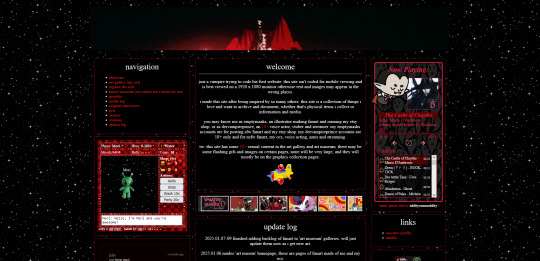
if you don't follow me on twitch or aren't in my discord, you might not know i've been coding my own website via neocities since june 2024. it's been a big labour of love, the only coding i'd done before is a little html to customize old tumblr themes, so i've learnt a lot and i've been having so much fun. i do link to it on my carrds but not everyone will know that the icon of a little cat with a wrench and paintbrush is the neocities logo, or even what neocities is.
neocities is a free website builder, but not like squarespace or wix that let you build a website from a template with things you can drag in, it's all done with html and css code (and you can throw in javascript if you wanna try hurting your brain /hj). i love the passion people have for coding websites, for making their own websites again in defiance of social medias becoming less customisable and websites looking boring and the same as each other. people's neocities sites are so fun to look through, looking at how they express themselves, their art galleries, shrines to their pets or favourite characters or shows or toys or places they've been.
why have i been making a website this way?
well i used to love customising my tumblr theme back when clicking on someone's username here took you to their tumblr website, their username . tumblr . com link that you could edit and customise with html code. now clicking a username takes you to their mobile page view, a lot of users don't even know you can have a website with tumblr, the feature to have a site became turned off by default, and i've heard from some users that they might have to pay to unlock that feature.
i've always loved the look of old geocities and angelfire websites, personalised sites, and i've grown tired of every social media trying to look the same as each other, remove features that let users customise their profiles and pages more. and then i found out about neocities.
are you interested in making a site too?
neocities is free, though you can pay to support them. there is no ads, no popups, they have no ai tool scraping their sites, no tos that will change to suddenly stop allow 18+ art. unlike other website hosters, neocities does have a sort of social media side where you do have a profile and people can follow you and leave comments on your site and like your updates, but you can ignore this if you want, or use it to get to know other webmasters.
to quote neocities "we are tired of living in an online world where people are isolated from each other on boring, generic social networks that don't let us truly express ourselves. it's time we took back our personalities from these sterilized, lifeless, monetized, data mined, monitored addiction machines and let our creativity flourish again."
i'd so encourage anyone interested to try making a website with neocities. w3schools is an excellent place to start learning coding, and there are free website templates you can copy and paste and use (my site is built off two different free codes, one from fujoshi . nekoweb . org and the other from sadgrl's free layout builder tool).
your site can be for anything:
a more fun and interactive online business card (rather than using carrd.co or linktree)
a gallery of your art/photos/cosplays/etc
a blog
webshrines to your a character, film, song, game, toy, hobby, your pet - anything can be a shrine!
a catalogue/database/log of every film you've watched, every place you've visited, birds you've seen, plushies you own, every blinkie gif you have saved, your ocs and stories, etc
hosting a webcomic
a fanwiki/fansite that doesn't have endless ads like fandom . com does (i found a cool neocities fansite for rhythm game series pop'n music and it's so thorough, it even lists all the sprites and official art for every character)
i follow a website that just reviews every video game based on whether or not it has a frog in it, if the frog is playable, if you can be friends with it. ( frogreview . neocities . org )
the only html i knew how to write before starting is how to paragraph and bold text. and now i have a whole site! and i'm still working on new stuff for it all the time.
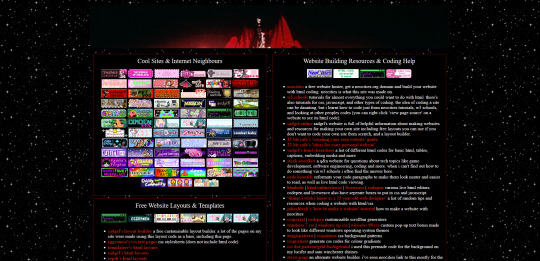
i just finished making a page on my website called 'explore the web'. this page lists everything you might need to know when wanting to make or decorate your website. it lists:
other neocities sites i think are cool and i'm inspired by, check them out for more ideas of what your site could look like and contain!
website building resources
coding help and tutorials
free website html code layouts you can use if you don't want too start coding from scratch
places to find graphics and decorative images for your site (transparent background pngs, pixels, favicons, stamps, blinkies, buttons, userboxes, etc)
image generators for different types of buttons and gifs (88x31 buttons, tiny identity buttons, heart locket open gifs, headpat gifs)
widgets and games and interactive elements you can add to your site (music players, interactive pets like gifypet and tamanotchi, hit counters, games like pacman and crosswords, guestbooks and chatboxes, etc)
web manifestos, guides, introductions and explanations of webmastering and neocities (some posts made by other tumblr users here are what made me finally want to make my own site and discover how too)
art tools, resources and free drawing programs
web communities! webrings, cliques, fanlistings, pixel clubs (pixel art trades) and more!
other fun sites that didn't fit in the other categories like free sheet music sites, archives, egotistical.goat (see a tumblr users audio posts/reblogs as a music playlist), soul void (a wonderful free to play video game i adore), an online omnichord you can play, and more.
i really hope the 'explore the web' page is helpful, it took three days to track down every link and find resources to add.
and if you want to check out my site there's more than just these pages. like i said in the beginning, i recently finished making:
the dervampireprince fanart museum
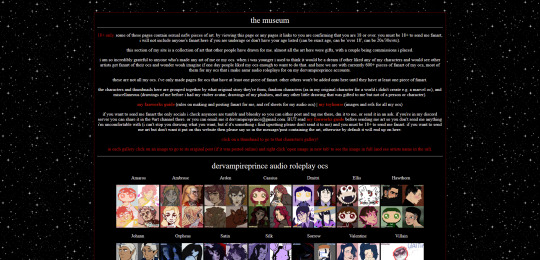
every piece of fanart i've received (unless the sender asked me to keep it private) has been added to this museum and where possible links back to the original artists post of that art (a lot the art was sent to me via discord so i can't link to the original post). every piece of fanart sent to me now will be added on their unless you specifically say you don't want it going on there. there's also links to my fanworks guide on there and how to send me fanart.
other pages on my site
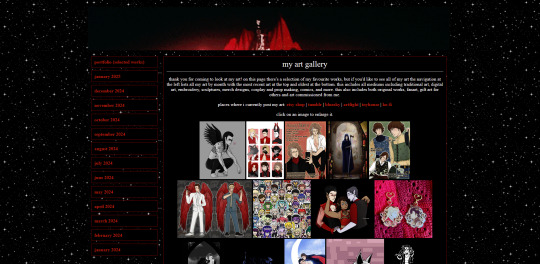
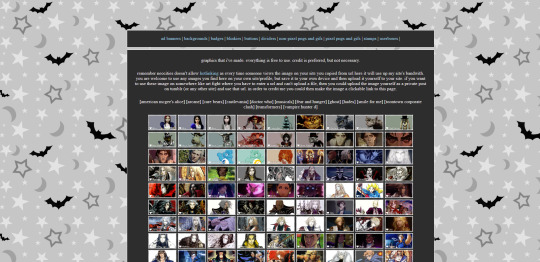
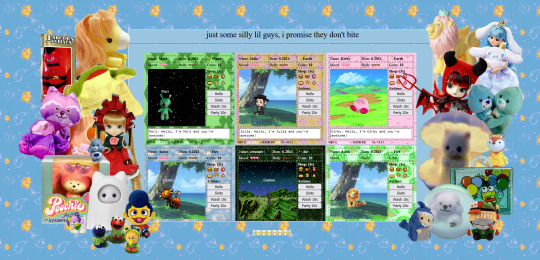
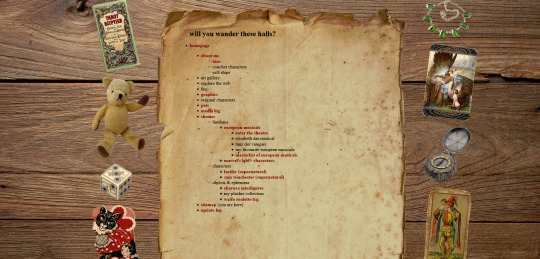
about me (including favourite media, quizzes, comfort characters, kins, and more)
art gallery (art i've made, sorted by month)
graphics (so far it's just stamps i've made but plan to remake this section of my site)
media log (haven't started the 2025 one yet, but a log of all films, tv, writing, music, theatre, fandoms, characters and ships i got into in 2024)
silly web pets
shrines
site map
update log
my shrines so far:
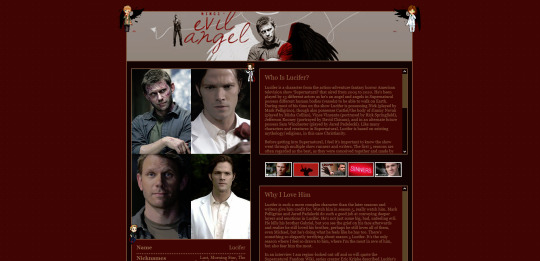
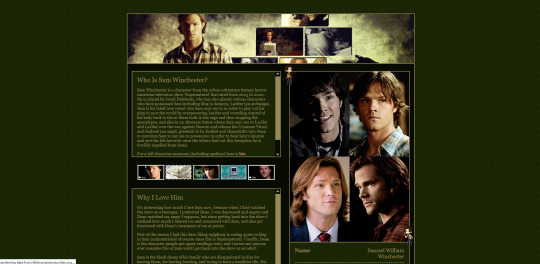
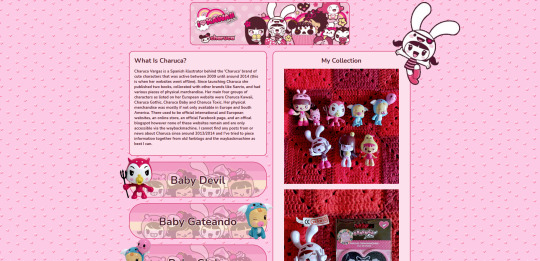
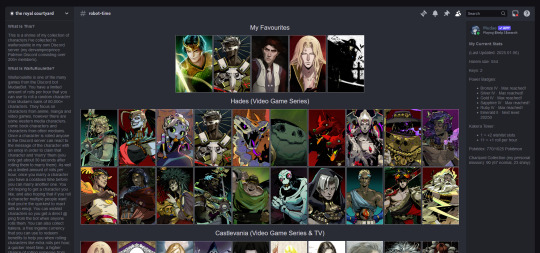
i have ones for lucifer from supernatural, sam winchester from supernatural, charuca minifigures (arcade prizes i wanted as a kid that i'm trying to finish collecting as an adult), my waifuroulette discord tcg collection. my masterlist of every lgbt+ marvel character is a wip. i love making each shrine look different and suit the character/fandom/thing the shrine is about. and then there's also:
the european musical section
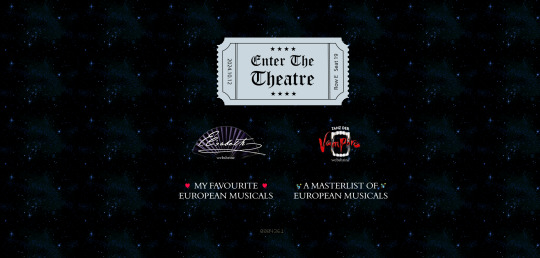
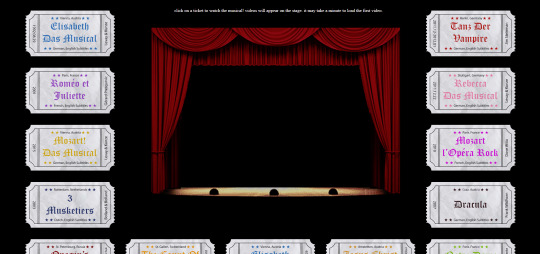
i ramble about them a lot and it's no surprise there's multiple shrines for them. i fell in love with german musical theatre in 2020 and that expanded in being interested in all non-english language musical theatre and trying to spread the word of it and how they deserve to be as known as english-language musicals. one musical in particular, elisabeth das musical, is my biggest special interest so expect a very detailed shrine about that one day.
so far this part of the site includes
'enter the theatre' an interactive web theatre where you choose a ticket and that musical will play on the stage (click a ticket and the embedded youtube video for that musical will appear on the stage and play. i dealt with javascript for the first time to bring the vision i had for this page alive, it might be slow but i hope enjoyable)
elisabeth das musical webshrine [not made yet]
tanz der vampire webshrine [not made yet, might abandon the idea]
my favourite european musicals [not made yet]
a masterlist of european musicals [a wip, only two musicals listed so far, i am listing every musical and every production they've had, this was a word document i kept for a long time that i always wanted to share somehow and this page is how i'll do it. there's no other list for european musicals out there so i guess it's up to me as always /lh]
the future for my site
i will update my art gallery, the fanart museum, my media log and other collections as often as i can. there's so many more pages i want to add including:
profiles for my ocs
finish my european musical masterlist
finish my 'every marvel lgbt+ character' masterlist (i have no love for marvel or disney's lgbt+ representation nor are all of these characters good representation and a lot are very minor characters, but for some reason i have gotten hyperfixated on this topic a few times so here comes a masterlist)
make shrines for loki (marvel), ares (hades), my sylvanian families collection, vocaloid (and/or vocaloid medleys), my plushie collection, pullip dolls
make a 'page not found' page
and i have one big plan to essentially make a site within a site, and make a website for my monster boy band ocs. but make it as if it was a real band, an unfiction project (think like how welcome home's website portrays welcome home as if it was a real show). this site would have pages for the band members, their albums, merch and maybe a pretend shop, and a fake forum where you could see other characters in the story talking and click on their profiles to find out more about them. and then once that's all done i want to start posting audios about the characters and then people can go to the website to find out more about them. that's my big plan anyway. i hope that sounds interesting.
i also want to make an effort to try and join some website communities. be brave and apply for some webrings and fanlistings, and make some pixel art and join some of the amazing pixel clubs out there.
but yeah, that's my site, that's neocities. i hope that was interesting. i hope it encourages people to make their own site, or at least look at other's small websites and explore this part of the internet. and if you go and check out mine feel free to drop a message in the guestbook on the homepage, or follow me on neocities if you have/make an account.
67 notes
·
View notes
Note
Hi!! I wanted to say that I loved reading about your journey of creating a personal website. I'm still unsure between Vercel and Netlify. I have a small question to ask. See, one of the reasons I want to make a website is to archive drawings and journal/sketchbook. Would you have any tips for creating an area on my website just for the diary/journal, which has tags, files for each entry, etc.?
Bello!

Really happy to hear about your interest in websites! I want everyone to make their own site so I don't have to log into social media and get instant tummyaches ♥
Vercel vs Netlify: I think I settled on Vercel for absolutely no reason whatsoever. I just made a site on Netlify, then tested on Vercel, and now I have like 5 websites on Vercel so I just kept using it LOL. I'm sure a more tech-savvy person would know the difference - I think they have certain integrations with specific programs.
Creating a diary or journal with tags:
There's a couple of different ways you can do that, with different levels of work needed.
you got me yapping again:
This sadgrl tutorial might be outdated and may or may not work, but explains the process better than I can.
Easiest: make a journal on Dreamwidth, or another blogging site (wordpress??) that allows easy tags and RSS feed, and embed that RSS feed onto your site.
This requires almost no HTML set-up, and the easiest to organize tags, but you don't truly have the data on your own site since it's just embedded.
When I snuck into a web design class at college, this was one of the methods that the professor used for a blog within a portfolio site LOL.
Shit like wordpress is what a LOT of ~professional~ sites do for their blog section. They code it separately from the main site haha. It's the most popular thing, but not necessarily the best. And wait til you read on what the CEO of wordpress has been having meltdowns about... he owns tumblr too!
It's made with a tutorial for Neocities if that's what you use.
Medium: Set up zonelets.
It will require some HTML and JS editing, but will help automate making headers/footers for each page of a blog.
I've never used it myself, but I see other people speak highly of it.
HARD FOR ME CUZ I'M A GORILLA: I believe a lot of professional web devs will slap your face with their coding cock until you use a static site generator (SSG) to make your site.
You will need some coding knowledge to set up the tagging system since it doesn't come with it enabled by default. But it's made explicitly to be an alternative to big Static Site Generators which are...
It requires some more intimidating knowledge, because it's a lot of scripts that turn files that are not HTML/CSS/JS into plain HTML.
Also you have to use the command line, and that doesn't come with buttons that tell you what you can do. You have to copy/paste all that shit or memorize the code to 'dev build astro' and it all looks silly.
I've used Eleventy, and now am using Astro. Other people use Hugo or Jekyll or some other stuff with crazy names like Glup Shitto. I hate all these sites cuz none of the words mean anything to me. This is a common theme for me and tech. I don't know what NODES or CONTENT or ISLANDS are!!!
I had the most success attempting to learn how to use a SSG by downloading a template and altering it with github + VScodium. Here's the template page for Astro. You click on a theme you like, and it takes you to its github page. (If you don't want to use evil Microsoft stuff sorry. Skip this entire section.) Follow the instructions on the page for "forking" the glup shitto. When it tells you to run commands, I run those commands through the terminal window in VScodium. These tutorials never tell you what these commands do cuz they assume you already know. Usually those commands automatically install the files you need onto your computer, and create the final files.
You can see my wip here for a "tag system" that SHOULD show members of a web listing haha but I don't know what I'm doing and I have a reading disorder AND don't know cumputer good.
THEORETICALLY this will be the simplest and easiest way to maintain tags and files, because after you set it up you just have to write the "content" of the blog page. And you don't have to set up the header/footer ever again. I see the vision, and potential, but I am not there yet when it takes me 5 hours a day to figure out what any of the words in the documentation mean and I don't want to ask an actual tech person cuz they will be like 'obviously just press the Blip on the Repository and then Suck My Ass in the command line".
(side note I haven't updated fujofans in like a year cuz I'm struggling with this part to make updating easier).
Con: the final HTML/CSS code is really ugly if it's "minified", and a lot of themes use """"""professional"""""" CSS libraries like Bootstrap and Tailwind that I honestly think are ugly cuz that's what every fuckin' tech website uses to style their pages and make them look Professional and Minimalist with stupid code like style="500-w dark-gray-balls D-cup-bra" on every single element. Even Toyhouse uses Bootstrap. Eugh!
But maybe you're smarter than me and can wrangle these things better!
That was really long. Woops. I hope you can slug through this wall of text and find something helpful. Feel free to email me if you have any more specific questions. I may or may not be helpful.
If someone else sees this and has better suggestions for making BLOGS, please chime in. I'm begging you.
64 notes
·
View notes
Text
Small Rarebit basics to start your webcomic site
pt 1
If you are interested in having your own comic site you may have come across people suggesting rarebit. Rarebit is a comic template you can use to do so.
I do know some HTML and CSS, but even then back when I downloaded rarebit for the first time I was still a bit confused on where to start, so I hope this small guide helps anyone that is interested on starting their own comic site using it.
In this part I’m going to change the logo and navigation buttons on the site.
1.- Download Rarebit from: https://rarebit.neocities.org/ ← You can also read information about it in here and check out other sites that use it.
2.- You will get a zip file with the basic things needed to set up your comic site

3.- You will place these HTML files and folders in your Neocities site dashboard
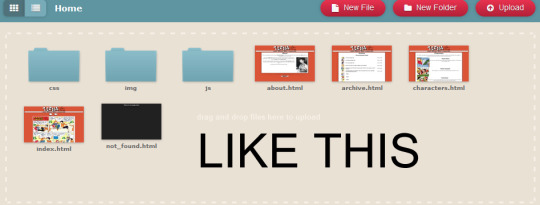
4.- Changing your logo
If you open the Index right now it will look like this:
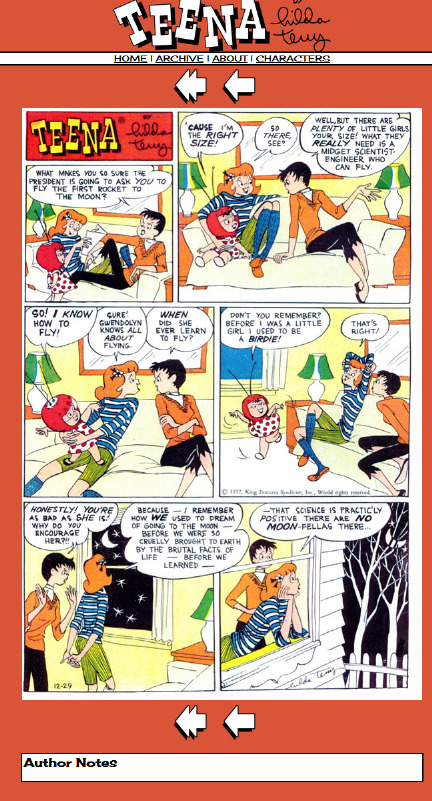
I started changing the img files that make up the site to mine for this, starting with the logo, you can find it on the img folder
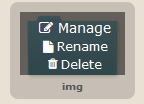
Select manage, these are the contents of the folder:
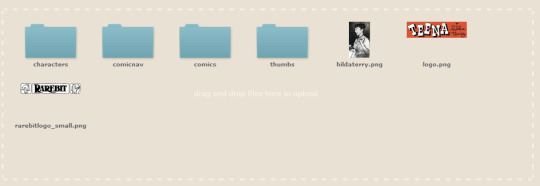
characters: stores the images for your characters page
comicnav: the navigation arrows for your site
comics: This is where you place your comic pages, your comic pages have to start with pg and then followed by a number, I will touch on that later.
thumbs: you can place thumbnails for your comic archive, this is optional and you can turn it off, personally I don’t use them but if you want them they are there.
Hildaterry.png: this is a placeholder image for the about page, you can delete it or replace it later on when you build your about page.
logo.png: What I did was open this file and replace it with my own logo, then overwrite, next time you open the index page it will have been replaced.
rarebitlogo_small.png: this is the image used in the credits to give credit to rarebit.
-Once you’ve replaced the logo file for your logo it you will notice the change in the index.
Note. The name of your logo file must have the same exact name of logo.png.
after the change:
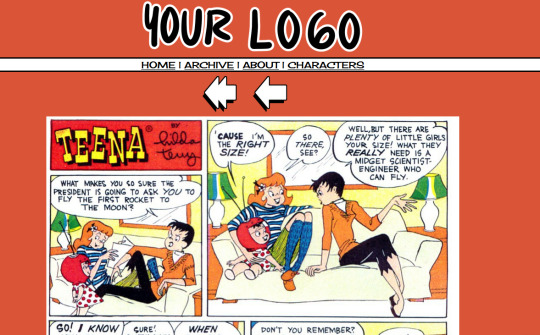
Good start isn’t it? You can do this with your nav buttons as well, just replace the files on your comicnav folder.
Rarebit Credits:
Rarebit site
Rarebit's creator's ko-fi and patreon
Part 2
131 notes
·
View notes
Note
Hey Derin,
I am thinking about making a website for my writing. There are a lot of options, so I'm kinda overwhelmed.
So I'm asking other authors I know, on and offline, about their websites. Mostly I'm wondering how much code I need to learn and what my upfront and upkeep costs might be.
How did you go about setting up your website? Did you learn code? Do you pay a monthly fee?
Any pointers are greatly appreciated!
My website is through Wordpress.com, although I would've gone with somebody else if the Matt Mullenweg stuff had all preceded me getting a website. You can also use Wix, Canva, Weebly, or whatever other website builder you like.
If you want to build a proper website, you need to code; however, for basically any of these 'free website builder' tools, you don't. I had to do zero coding to build mine, not even any html. I just signed up for a free account and built it from a template, much like making a Tumblr page.
I'm pretty sure all of the options I listed above let you make a free website. There are also multiple smaller free website builders out there. I pay for mine now, so I can control the domain name and provide the stories without any ads (free websites are usually full of ads and I have online ads). But I didn't start paying until I was making enough on Patreon to do so. You absolutely can do it for free; I did for a long time. There are zero upfront costs and zero coding required to do things this way.
You can, of course, code a proper website and buy a domain for it if you have the skills and cash and want more flexibility and control in designing your website. For web serials, I've never found this necessary.
46 notes
·
View notes
Note
do you have any posts already or if not would you be willing to share any information about what the process of getting the website up and running was like? i'm really interested in getting a site going for some other photo/record keeping projects and i know a decent amount about website design and basic html, but not that much about the process of actually getting it online;^;
Happy to share!
To be clear, my level of coding skill began with teaching myself html for neopets and ended with cobbling together vaguely custom css for my OG personal tumblr in 2011. So in terms of the physical backend of the website… it’s just Squarespace.
Getting it online is pretty simple if you’re not writing the code yourself, but there’s some stuff you’ve got to figure out first: what the name of your site will be, what url (domain) you want it to have, where to buy it, and where you want to host the site (like squarespace or Wordpress).
Once you’ve got the details sorted, you get an account on the hosting platform you want to use, and then set up the site and connect a domain. Squarespace lets you buy domains directly through their interface, but it tends to be more expensive than buying it directly from a registrar company like Namecheap or GoDaddy. If you’re comfortable teaching yourself to navigate basic internet stuff via Google, it isn’t too hard to learn how to tell a domain you bought elsewhere to point at your site. (Everything I’ve done to run all my websites has been self-taught via Google and Reddit, with the assistance of some very patient techie friends).
Once you’ve got the crunchy stuff set up, you build the site! I use Squarespace preferentially over Wordpress because a) I like the aesthetic of the templates and b) it’s what I know how to use. Wordpress is cheaper but trying to navigate the visual layout of the site annoyed me to the point it wasn’t fun anymore, so I personally will pay for ease of access on layout and design stuff.
To build the site, I thought through what I wanted the user experience to be, and how I wanted people to navigate, and I built with that in mind. For the photo repository, my goal was very clean visuals that really showcased the photos, and I wanted people to be able to navigate the taxonomy both visually and from a list. Honestly, just play with it, and try different things until you find a layout you like.
Then you try to break the site you’ve built. Because there will be errors and bugs and as much as I do appreciate it when y’all send me problems you encounter, I’d rather fix it first. I always check a new site on a desktop computer, tablet, and phone, and then ask a couple friends running different operating systems to do the same. That’s a good time to get feedback on things like layout and font size and readability, too.
The biggest time sink for the project has actually just been the photo management. I had to figure out how I needed things organized to build the site, and then taking the time to upload them all is the major rate-limiting factor.
You can launch the site so it’s “online” at any point during this process after you’ve paid for hosting and the domain and set it up, but I tend to wait until I’ve built the site and beta tested it sufficiently.
I’m happy to answer other questions, I’m just not sure what else would be helpful!
38 notes
·
View notes
Text

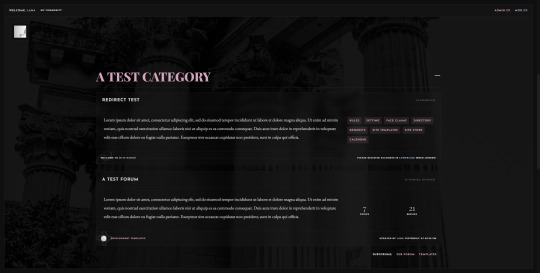
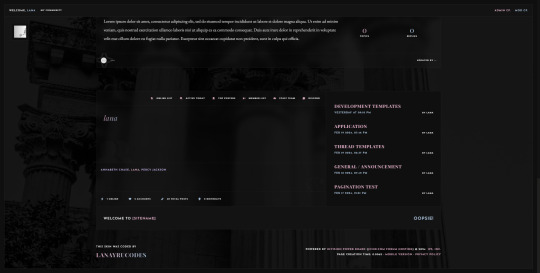
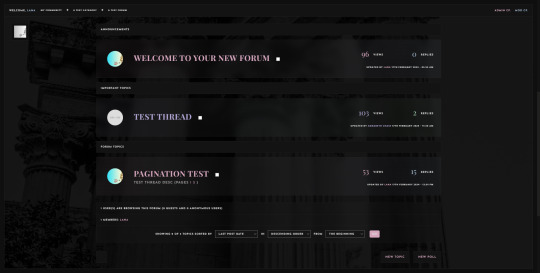
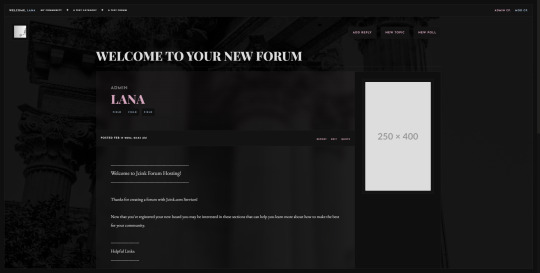
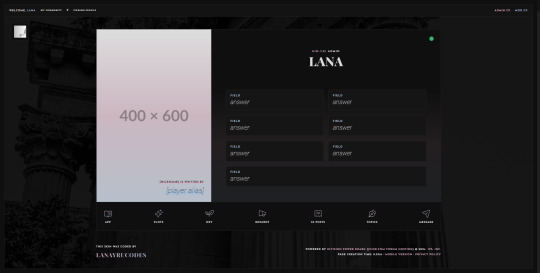
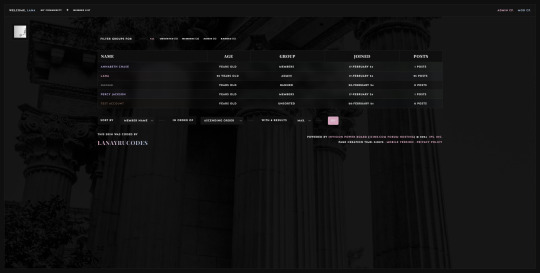

Immortales: Skin Bundle ($20)
I've been wanting to branch out into a more minimalist style for a while, and found the opportunity to do so when I was struck by the coding bug over the weekend and began to experiment with a more semi-transparent style of index that eventually evolved into this. I tried to keep the skin as light as physically possible, with minimal Javascript or Jquery inclusions, and instead tried to optimize it to build off of HTML5 elements as best I could without needing to weigh it down with more external resources.
The Immortales skin is a dark themed, responsive skin for Jcink forums, and is optimized for Google Chrome. (Cross-tested in Opera GX and Mozilla Firefox.)
You can purchase the skin here: https://ko-fi[DOT]com/s/6f663cfe6e
Bundle Includes:
All custom HTML structures
a forum index a topic row for threads a post row with a sticky/hover mini profile a main profile custom board stats, with the five (5) recent topics appended a member list, sortable by filters
Full set of DOHTML templates
x1 general announcement/admin template x1 application template (tabbed, for threads) x4 thread templates x5 development templates x1 miscellaneous codes for TW/CW x1 tabbed webpage/guidebook
Custom Userlinks Menu
Easy to add/modify group variables for color coordination (five groups already included)
Responsive to smaller monitors
Upon purchase, buyers will receive an installation guide with editing and customization instructions, as well as any XML/HTML files.
Support & Refunds:
Refunds or returns are not offered on pre-made skins. Due to the nature of how they're distributed and the fact that they're digital files I cannot offer refunds for a purchase if you buy a skin from me.
If you encounter bugs or skin-breaking issues, please reach out to me and I will do my best to fix them and provide you with updated files.
I do not offer coding support beyond initial problems with my skins at install. (i.e. Finding a bug when you install a fresh copy of the skin onto your site, etc.) If the skin breaks during modifications you make on your own, I am willing to help restore the skin to it's original state. I do not provide support for third party coding that is not mine.
#jcink skins#jcink codes#jcink code#jcink skin#dark jcink skin#dark theme skin#for sale#skin for sale#jcink skin for sale#jcink rp#immortales skin#portfolio
94 notes
·
View notes
Note
Hi, I was wondering if there are any updated tutorials on how to make themes? Also, if you publish this message, maybe some might suggest tutorials, base codes? Thank you, have a great one *hug*
hello hello nonny! sorry it took me days to reply but basically:
start with the tumblr documentation and familiarize yourself with the post blocks. then, you can choose base codes. the most updated ones are by eggdesign which are:
npf based template (this one supports new posts)
and this basic base one
if you opt to build your own, it is important that you have these scripts:
unnested captions by magnusthemes and neothm
npf fix by glenthemes
lightbox tutorial by shythemes
then, there's the designing parts:
google fonts for fonts of any kind
learn html x learn css by w3schools
phosphor icons. or you may browse glen's collection of icon fonts.
flex-box tutorial to make your designing easier
and on the advanced side, learn how to make anything responsive/mobile friendly
additional tutorials maybe found in w3schools and css-tricks.
idk if you'd like modals/popups but this is the tutorial that i use. and as for multiple tabs, i use this script too.
and shamelessly advertising my credits page because it's a masterpost of some sort that helped me with my coding journey
also just a tip, when coding anything, picture the lines that u input as a language of its own and picture how it wants to portray a div ^^
14 notes
·
View notes
Text
one of my favorite args against ai is where people seem to believe you cannot do anything just for the sake of getting it done. You have to pursue absolute virtuosity. You can't just generate a background for your desktop that matches your vibe, because then you lose the vast artistic skill youd have gained by spending 12 years doing it instead.
You can't just have a text in a language youre learning generated so you can see the words in order, because then youre missing out on the cultural exchange of just moving to a country that speaks that language.
You cant just have an llm generate a css template because then you lose the character building of packing hand written css uphill both ways in the snow to become a master of aligning text to the right or left.
Whole genre of people pretending for an object to exist it needs to represent a personal character arc through the five stages of grief cuz by god those html tables are all your grandfather had when he died you ungrateful bitch.
You can't just have things that dont represent a meaningful distillation of your entire hardwon identity you fuckin pervert. its fucking CSS. Javascript. A pfp. Things that are definitely holy and exactly this big a deal.
15 notes
·
View notes